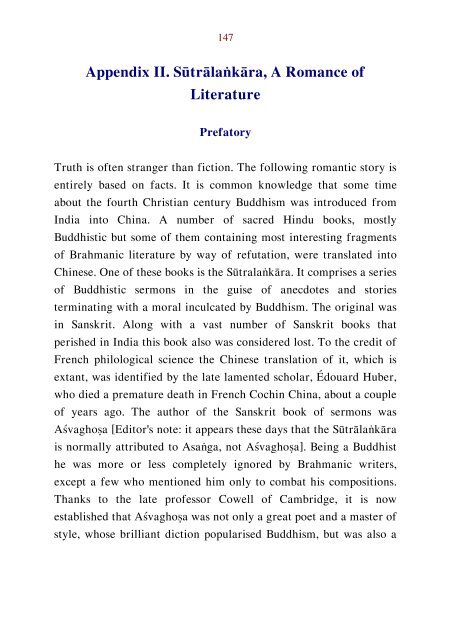Literary History of Sanskrit Buddhism
A study by J. K. Nariman of Sanskrit Buddhism from the Early Buddhist Tradition up to the Mahayana texts proper.
A study by J. K. Nariman of Sanskrit Buddhism from the Early Buddhist Tradition up to the Mahayana texts proper.
Create successful ePaper yourself
Turn your PDF publications into a flip-book with our unique Google optimized e-Paper software.
147<br />
Appendix II. Sūtrālaṅkāra, A Romance <strong>of</strong><br />
Literature<br />
Prefatory<br />
Truth is <strong>of</strong>ten stranger than fiction. The following romantic story is<br />
entirely based on facts. It is common knowledge that some time<br />
about the fourth Christian century <strong>Buddhism</strong> was introduced from<br />
India into China. A number <strong>of</strong> sacred Hindu books, mostly<br />
Buddhistic but some <strong>of</strong> them containing most interesting fragments<br />
<strong>of</strong> Brahmanic literature by way <strong>of</strong> refutation, were translated into<br />
Chinese. One <strong>of</strong> these books is the Sūtralaṅkāra. It comprises a series<br />
<strong>of</strong> Buddhistic sermons in the guise <strong>of</strong> anecdotes and stories<br />
terminating with a moral inculcated by <strong>Buddhism</strong>. The original was<br />
in <strong>Sanskrit</strong>. Along with a vast number <strong>of</strong> <strong>Sanskrit</strong> books that<br />
perished in India this book also was considered lost. To the credit <strong>of</strong><br />
French philological science the Chinese translation <strong>of</strong> it, which is<br />
extant, was identified by the late lamented scholar, Édouard Huber,<br />
who died a premature death in French Cochin China, about a couple<br />
<strong>of</strong> years ago. The author <strong>of</strong> the <strong>Sanskrit</strong> book <strong>of</strong> sermons was<br />
Aśvaghoṣa [Editor's note: it appears these days that the Sūtrālaṅkāra<br />
is normally attributed to Asaṅga, not Aśvaghoṣa]. Being a Buddhist<br />
he was more or less completely ignored by Brahmanic writers,<br />
except a few who mentioned him only to combat his compositions.<br />
Thanks to the late pr<strong>of</strong>essor Cowell <strong>of</strong> Cambridge, it is now<br />
established that Aśvaghoṣa was not only a great poet and a master <strong>of</strong><br />
style, whose brilliant diction popularised <strong>Buddhism</strong>, but was also a


















